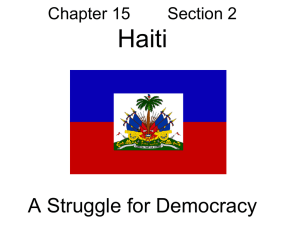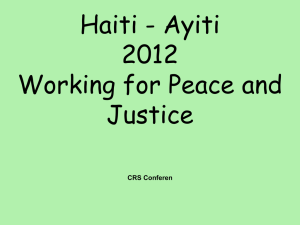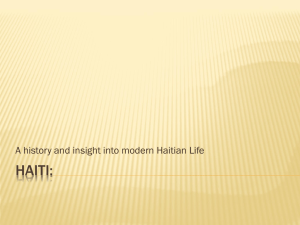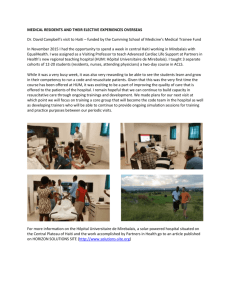press release (Word document)
advertisement
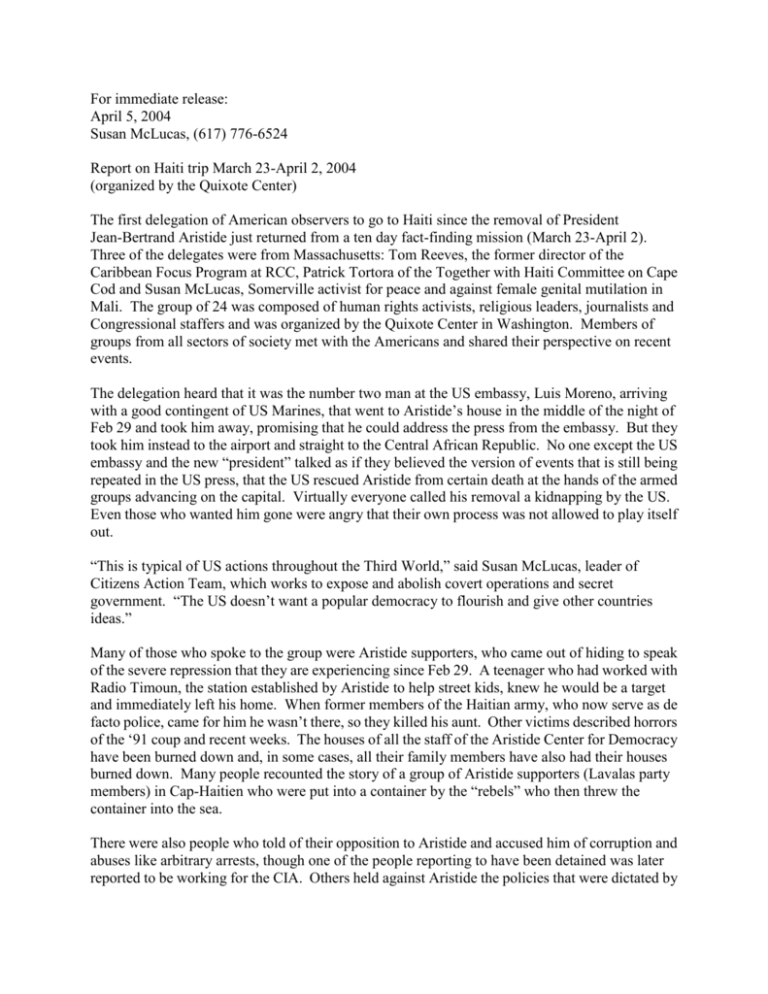
For immediate release: April 5, 2004 Susan McLucas, (617) 776-6524 Report on Haiti trip March 23-April 2, 2004 (organized by the Quixote Center) The first delegation of American observers to go to Haiti since the removal of President Jean-Bertrand Aristide just returned from a ten day fact-finding mission (March 23-April 2). Three of the delegates were from Massachusetts: Tom Reeves, the former director of the Caribbean Focus Program at RCC, Patrick Tortora of the Together with Haiti Committee on Cape Cod and Susan McLucas, Somerville activist for peace and against female genital mutilation in Mali. The group of 24 was composed of human rights activists, religious leaders, journalists and Congressional staffers and was organized by the Quixote Center in Washington. Members of groups from all sectors of society met with the Americans and shared their perspective on recent events. The delegation heard that it was the number two man at the US embassy, Luis Moreno, arriving with a good contingent of US Marines, that went to Aristide’s house in the middle of the night of Feb 29 and took him away, promising that he could address the press from the embassy. But they took him instead to the airport and straight to the Central African Republic. No one except the US embassy and the new “president” talked as if they believed the version of events that is still being repeated in the US press, that the US rescued Aristide from certain death at the hands of the armed groups advancing on the capital. Virtually everyone called his removal a kidnapping by the US. Even those who wanted him gone were angry that their own process was not allowed to play itself out. “This is typical of US actions throughout the Third World,” said Susan McLucas, leader of Citizens Action Team, which works to expose and abolish covert operations and secret government. “The US doesn’t want a popular democracy to flourish and give other countries ideas.” Many of those who spoke to the group were Aristide supporters, who came out of hiding to speak of the severe repression that they are experiencing since Feb 29. A teenager who had worked with Radio Timoun, the station established by Aristide to help street kids, knew he would be a target and immediately left his home. When former members of the Haitian army, who now serve as de facto police, came for him he wasn’t there, so they killed his aunt. Other victims described horrors of the ‘91 coup and recent weeks. The houses of all the staff of the Aristide Center for Democracy have been burned down and, in some cases, all their family members have also had their houses burned down. Many people recounted the story of a group of Aristide supporters (Lavalas party members) in Cap-Haitien who were put into a container by the “rebels” who then threw the container into the sea. There were also people who told of their opposition to Aristide and accused him of corruption and abuses like arbitrary arrests, though one of the people reporting to have been detained was later reported to be working for the CIA. Others held against Aristide the policies that were dictated by the US as a condition for returning him to power in 1994, like building free trade zones, where workers work for very little money and the companies get big tax breaks. People were also angry about violence by what are called “chimères,’ gangs of poor youth, considered to be Aristide supporters. It is debatable how much control Aristide had over these gangs probably not too much and there is some deliberate exaggeration of the relation by those who are against Aristide. The situation is very complex but one thing that everyone seems to agree on is opposition to the American-led occupation. The group heard from a number of sources that one neighborhood where support for Aristide and the Lavalas party is very strong had a big demonstration, supporting his return. The crowd of thousands apparently taunted Marines with outstretched fingers indicating that Aristide’s term was for five years and also showing their dislike for the occupation. A few days later it was reported that Marines came into the neighborhood, Belair, with tanks, firing in the middle of the night. They were followed by Haitian police. Between them, they killed dozens of people, whom they took away in ambulances. There have been fewer demonstrations for Aristide’s return since that time. Factory workers described how attendance at anti-Aristide demonstrations was required in order to keep their jobs, and said that they were paid about $10 each, a very large sum for sweatshop workers. Having lots of money to spend was also a big advantage to the invading “rebels” who paid $400 to policemen to abandon their posts and allow the heavily armed fighters to proceed toward Port au Prince. The violent situation was exacerbated by the emptying out of the prison in Port au Prince, which held many convicted killers from the previous coup period and old army. They are now leading the reprisals against Aristide supporters. The group heard from a number of sources that all recent official US funding of non-government organizations went to anti-Aristide groups, while the US denied aid and loans to the Aristide government through US AID and the Interamerican Development Bank. With no money, and with his hands tied by agreements he was forced to accept, it was hard for Aristide to make good on the promises he had made of a better life for the people, including the poor, who are the vast majority of Haitians. Also, knowing that he was in the sights of the US diverted his attention and contributed to a siege mentality. He spent a lot of time and energy dealing with politically connected Americans who could help him stay in power. He gave expensive cars to people in the government, trying to insure their loyalty. Some said he was not a good administrator and didn’t delegate responsibility well, so that people working for him became frustrated. He also concentrated too much on the capital and neglected the rural areas. The new “president” of Haiti, Boniface Alexandre, met with the delegation and explained that his main role was to prepare for the elections, which will be held at some point in the future. One of the many Marines at the palace said that the president hadn’t left the palace since he was installed. CARICOM, the organization of Caribbean states, has withheld recognition from the new government, as has the African Union. Legislation has been introduced in Congress by the Black Caucus to investigate the circumstances of Aristide’s removal. The delegation adopted a list of unanimous recommendations including investigations into the events of February 29, the funding and arming of the opposition (now in power) and human rights violations by the occupation forces; jailing of convicted criminals, and establishment of a truth commission. Differences over exactly how to do it prevented the group from making a consensus recommendation for Aristide’s return, but the overwhelming, general feeling among the group was of utter opposition to the US intervention and, for many, shame and sadness about the history of US intervention on the side of the elites and corporate interests all over the world. Susan McLucas, Citizens Action Team (617) 776-6524 Tom Reeves can be reached at (617) 522-2599 for the next few days and is at (514) 525-7098 when not in Boston. Patrick Tortora is at (508) 896-5647. The Quixote Center is at (301) 699-0042, and will make its own report available soon.
